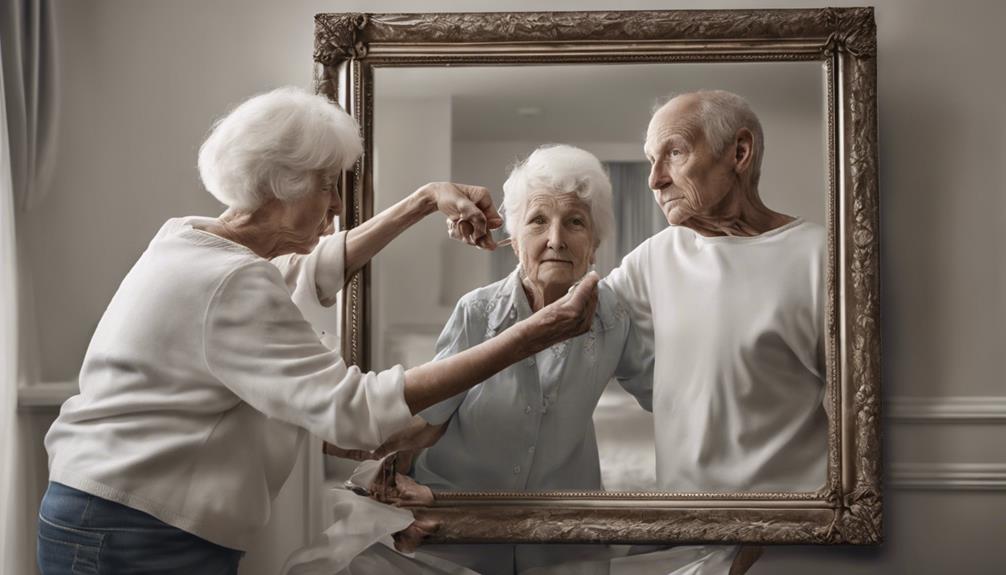Celebrity caretakers display great strength and resilience throughout their journeys. For example, Joey McIntyre channels his sorrow from his mother’s Alzheimer’s disease into advocacy and raising awareness. Patrick Dempsey stresses the significance of positivity and adaptability in caregiving. Leeza Gibbons offers crucial resources to assist caretakers dealing with similar difficulties, and Maria Shriver advocates for dignity and grace during health challenges. These narratives are not only motivational but also showcase the strength of love and community in caregiving. If you wish to learn more about their powerful experiences and perspectives, there is plenty more to explore.
Key Takeaways
- Celebrity caregivers, like Joey McIntyre and Patrick Dempsey, use personal experiences to advocate for better support and resources in caregiving.
- Leeza Gibbons and Maria Shriver focus on resilience and grace, emphasizing the importance of emotional support for caregivers facing challenges.
- Community networks provide essential resources, emotional backing, and shared experiences that empower caregivers to navigate their journeys effectively.
- Mindfulness, self-care, and gratitude are vital strategies that help caregivers manage stress and maintain their well-being throughout their caregiving roles.
- Celebrity caregivers inspire others by sharing their stories, highlighting love, patience, and adaptability as central themes in effective caregiving.
Joey McIntyre's Advocacy Journey

Joey McIntyre's journey as an advocate for Alzheimer's care is deeply personal and profoundly impactful. After losing his mother to the disease, he dedicates his efforts to raise awareness and funds for Alzheimer's research and care. You can feel the love he's for her, as he describes her final years as filled with sweetness and connection.
This emotional bond highlights how essential love is in facing the health challenges that come with caregiving. In moments of stress, many caregivers find solace in natural remedies, such as using essential oils like lavender for calming effects that can help ease anxiety and promote relaxation.
McIntyre often shares how his mother's strong faith shaped his outlook on life and caregiving. It's this foundation that inspires him to encourage others to tackle their caregiving challenges with compassion and resilience. He believes that when caregivers provide emotional support, they can make a significant difference in the lives of those affected by Alzheimer's.
Through his advocacy, McIntyre aims not only to honor his mother's legacy but also to inspire others traversing the complexities of caregiving. He shows that while Alzheimer's presents challenging health obstacles, it's the love and connection shared that truly matters.
Patrick Dempsey's Caregiver Empowerment

Patrick Dempsey's commitment to caregiver empowerment stems from his personal experience with his mother's battle against ovarian cancer. This journey inspired him to establish The Patrick Dempsey Center for Cancer Hope & Healing, a resource hub for cancer patients and their families.
Dempsey understands that caregivers often face immense stress, making it vital to incorporate practices that promote overall health and well-being, such as stress management techniques. Here are four key insights he emphasizes for caregivers:
- Positivity and Empowerment: Embrace a hopeful mindset to navigate challenges effectively.
- Be Patient and Proactive: Gather information from health professionals to improve your caregiving role.
- Adaptability: Recognize that caregiving requires flexibility to meet evolving needs.
- Self-Care: Prioritize your well-being to sustain your ability to care for others.
Dempsey believes that caregivers shouldn't just focus on their loved ones but also on their own health. He advocates for a balanced approach, reminding you that self-care isn't selfish; it's essential.
Leeza Gibbons' Resilience Through Alzheimer's

Gibbons emphasizes the significance of caregiver support, recognizing the emotional and physical health issues caregivers face. Her foundation offers essential resources and a community for those traversing similar paths.
Here's a glimpse of the impact her advocacy has made:
| Year | Initiative | Impact |
|---|---|---|
| 2002 | Foundation Established | Improved caregiver resources |
| 2005 | Caregiver Workshops | Increased awareness of health issues |
| 2010 | Advocacy Campaigns | Greater understanding of Alzheimer's |
| 2015 | Support Groups | Enhanced emotional support for caregivers |
| 2020 | Online Resources | Expanded access to information |
Through her efforts, Gibbons empowers caregivers and those affected by Alzheimer's, showcasing that resilience can indeed flourish amid adversity.
Maria Shriver's Fight for Dignity

Maria Shriver stands as a beacon of hope and advocacy in the Alzheimer's movement, passionately working to raise awareness about the disease's profound effects on families.
As you explore her journey, consider these key points:
- Shriver partners with the Alzheimer's Association to spread awareness.
- She authored and produced the film "Still Alice," spotlighting the challenges of Alzheimer's. In her advocacy, she highlights the importance of understanding the potential side effects and interactions of cold medications that caregivers may need to maneuver when managing their loved ones' health.
- Shriver emphasizes caregivers' need for grace and support.
- She advocates for living with dignity and elegance during health battles.
Through her work, Shriver inspires caregivers to prioritize their well-being while maneuvering the often overwhelming responsibilities of caring for loved ones.
She believes that every caregiver deserves support and empowerment to handle their roles effectively.
In her eyes, facing the health battles associated with Alzheimer's shouldn't strip away one's dignity—rather, it should be approached with compassion and resilience.
Community Support for Caregivers

As a caregiver, you know how essential it's to find support within your community. Accessing resources like newsletters and support groups can help you manage stress and connect with others who understand your journey.
Understanding the importance of emotional and psychological growth can provide additional insights into your caregiving role, particularly during challenging times when you might need key domains of development to guide your approach.
Resources for Caregiver Support
Caregiving can feel isolating, but community support networks offer invaluable resources to help you navigate this journey. Connecting with others can provide you with practical strategies and emotional support. Engaging with financial considerations for elderly care can also help you feel more empowered in your role.
Here are four essential resources for caregiver support:
- Newsletters: Subscribe to caregiver newsletters that deliver inspiration and practical tips straight to your inbox.
- Organizing Strategies: Utilize tools and strategies to help reduce stress and create a balanced caregiving experience.
- Stress Management Techniques: Explore mindfulness and self-compassion practices to maintain your well-being amid challenges.
- Support Groups: Join local or online support groups to connect with others who understand your experiences.
These resources can empower you to manage your caregiving journey more effectively. By seeking help from community support networks, you can gain crucial emotional backing and practical advice.
Importance of Community Networks
Community support networks play an essential role in the lives of caregivers, offering not just resources but also a sense of belonging.
These networks provide emotional support and connections with others facing similar challenges, which can help alleviate feelings of isolation and overwhelm that often accompany caregiving. Engaging with these networks can also enhance your financial awareness, helping you to create a budget plan that accommodates your caregiving responsibilities.
When you engage with these community support networks, you gain access to regular newsletters and organized resources that inspire and offer practical tips for managing your responsibilities.
Building supportive networks encourages you to seek help and share your experiences, fostering a sense of shared resilience within the community.
You'll find that connecting with others who understand your journey can be incredibly validating. Furthermore, these networks often include valuable insights on self-compassion, enabling you to navigate the emotional complexities of caregiving more effectively.
Strategies for Managing Stress
Finding effective strategies for managing stress is vital for caregivers who often juggle multiple responsibilities. Incorporating moments of joy, much like the uplifting themes found in songs like Blue Skies and Lemonade, can provide a rejuvenating break.
Here are four practical ways to enhance your health and well-being:
- Organize Tasks: Break down your responsibilities and set realistic goals. This helps reduce feelings of overwhelm and keeps you focused on what truly matters.
- Practice Mindfulness: Techniques like meditation and deep-breathing exercises can help you remain present and alleviate stress.
- Engage in Regular Exercise: Physical activity is a proven stress reliever. Even a daily walk can improve your mood and boost your health.
- Seek Support: Connect with community organizations or online forums where you can share experiences and gain emotional relief.
Additionally, subscribing to newsletters that offer inspiration and practical tips can be immensely beneficial.
Remember, self-compassion is key; it's okay to ask for help when you need it. By implementing these strategies, you'll not only enhance your own well-being but also better support your loved ones.
Prioritizing your mental health and resilience is essential in your caregiving journey.
Lessons Learned From Celebrity Experiences

Many celebrities have shared profound lessons learned from their caregiving experiences, offering valuable insights for anyone on a similar journey. Joey McIntyre sheds light on the importance of love, emphasizing that despite the challenges of his mother's Alzheimer's battle, maintaining a strong bond is essential.
Similarly, Patrick Dempsey stresses the need for patience and adaptability, drawing from his experiences during his mother's ovarian cancer diagnosis. This echoes the importance of understanding and managing emotional risk factors, much like risk management strategies for investments that help navigate uncertainties.
Leeza Gibbons learned resilience and courage through her mother's Alzheimer's fight, which inspired her to create a foundation aimed at improving care for those affected by the disease.
Maria Shriver echoes this sentiment, advocating for grace and support throughout the emotional journey of caregiving.
Dwayne Johnson reminds us of the significance of gratitude, sharing how caring for his mother during her stage 3 lung cancer battle taught him to appreciate daily blessings.
Collectively, these experiences shed light on the multifaceted nature of caregiving, highlighting love, patience, resilience, grace, and gratitude as essential elements. Caregiving is not without its challenges, yet it is in those very moments of difficulty that the raw beauty of the human spirit often shines brightest. It demands not only physical and emotional strength, but also a faithbased courage in caregiving—that unwavering belief that, despite the trials, you are walking a path of purpose. In embracing this courage, caregivers find a profound sense of fulfillment and connection, both with themselves and those they care for. Celebrating small victories in caregiving becomes not just a necessity but a lifeline, reminding caregivers that progress, no matter how incremental, holds immense value. These moments of triumph, whether it’s a shared smile, a peaceful afternoon, or a task completed with ease, serve as reaffirmations of purpose and hope. It is through these milestones that caregivers sustain their strength and nurture their own well-being, allowing them to continue giving with love and compassion.
Frequently Asked Questions
How Can I Connect With Other Caregivers for Support?
You can connect with other caregivers by joining local support groups, participating in online forums, or attending community events. Sharing your experiences and listening to others can create a strong network of support and understanding.
What Resources Are Available for Caregiver Education and Training?
Did you know nearly 70% of caregivers feel unprepared? You can access online courses, local workshops, and support groups to enhance your skills. These resources empower you to provide better care while boosting your confidence.
How Do Celebrities Manage Their Time as Caregivers?
Managing time as a caregiver takes careful planning. You prioritize tasks, set boundaries, and often delegate responsibilities. Embracing self-care helps you recharge, ensuring you remain present and effective in both caregiving and personal endeavors.
What Self-Care Strategies Do Celebrity Caregivers Recommend?
Studies show 60% of caregivers neglect self-care. To thrive, prioritize your well-being. Schedule regular breaks, engage in hobbies, and connect with supportive communities. Remember, taking care of yourself helps you care better for others.
Are There Any Support Groups Specifically for Celebrity Caregivers?
Yes, there are support groups specifically for celebrity caregivers. You can find both online and in-person options, allowing you to connect with others who understand your unique challenges and share valuable experiences for mutual support.
Conclusion
In a world where celebrities shine, it's ironic that their most profound moments come not from the spotlight, but from the shadows of caregiving. You realize that strength and resilience aren't just for the stage; they're woven into the fabric of everyday life. As you reflect on Joey, Patrick, Leeza, and Maria's journeys, it's clear: their struggles teach us that true celebrity lies in compassion and courage, reminding you that anyone can be a hero, even off-screen.









